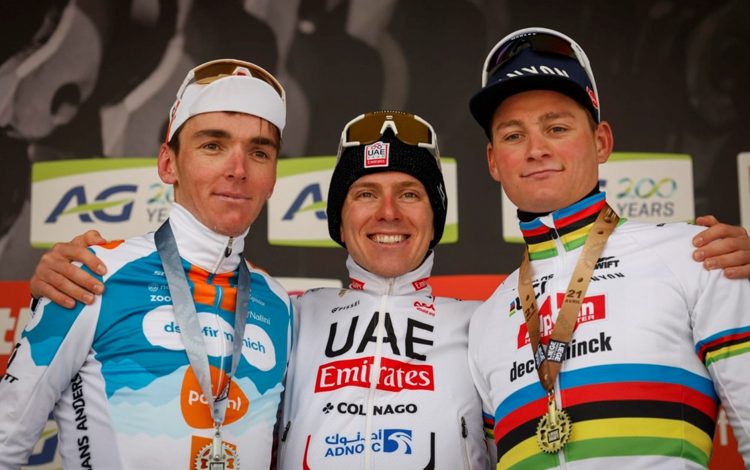Race Review: Liège-Bastogne-Liège
By Tim Perkin
The oldest Monument in the cycling calendar with its first edition held in 1892, Liège-Bastogne-Liège was raced in very cold conditions on 21st April this year, where Tadej Pogačar (UAE Team Emirates) emerged victorious for the second time in his career. This took the number of Monuments he has won to a total of six, which is remarkable considering he is only 25-years old. He will now turn his attention to the Giro d’Italia and the question is, can anyone stop him?
Pogačar versus Mathieu van der Poel
Liège-Bastogne-Liège was supposed to be a showdown between the current in form World Champion Mathieu van der Poel and Tadej Pogačar, however, it did not materialize.
Mathieu van der Poel has had a remarkable Classics campaign winning both the Tour of Flanders and Paris-Roubaix, where he soloed to victory some 56.7km from the finish, however, Liège-Bastogne-Liège is a different race. Its undulating course with excessive amount of climbing (4500 meters) across 11 classified climbs is usually not suited to larger riders like Van der Poel and this proved to be the case.
Despite this, Van der Poel still managed to secure a spot on the podium, taking third behind veteran French rider, Romain Bardet. This highlights not only the ability of the rider but the tremendous form he has been in over the last few weeks. Sadly, he was unable to become the first rider in history to win the Tour of Flanders, Paris-Roubaix and Liège-Bastogne-Liège in the same season.
Bardet secured his best ever finish in the event by finishing second and later stating “I’ve never felt so strong on a bike.”
The undisputed winner was Pogačar, who covered the 254.5km course in 6:13:48, a full 1 minute and 39 seconds ahead of Bardet in second. Van der Poel secured the final spot on the podium with a strong performance but finished 2 minutes and 2 seconds behind Pogačar.
How the race unfolded
The early breakaway of five riders managed to build a lead approaching 5minutes. However, with 100km to go, this gap had been reduced to 1 minute and then with 97.8km to go, there was a crash which caused the peloton to split.
Van der Poel was on the wrong side of the crash and recent Amstel Gold winner, Tom Pidcock, suffered a mechanical issue. At one point, the gap to the peloton had reached 1 minute and this was enough for Pidcock, who pushed the tempo in an attempt to bridge the gap.
Eventually, the race came back together, but sadly for Pidcock, he was unable to keep up when the decisive move came from Pogačar, who attacked on the Côte de la Redoute, with 34.8km remaining.
Once he accelerated, he simply rode away from his rivals. Richard Carapaz, the Olympic Champion tried but failed and no one could match his power. Interestingly, it was the same point in the race where Remco Evenepoel had launched his attack the previous year.
Pogačar’s lead quickly expanded to 25 seconds, and within just 5kms, he had built a lead of 1 minute. By the time Bardet attacked on the final climb with 12.8km left, Pogačar already had 1 minute and 22 seconds to his advantage. Bardet found himself racing for second place. Behind him, the impetus of the chasing group disappeared, allowing Van der Poel to rejoin the group with 5km left to the finish line.
As Pogačar cruised to victory and Bardet fought for a well-deserved second place, Van der Poel emerged victorious in the bunch sprint, securing third.

(Image source: CorVos/PezCyclingNews)
Overview
Liège-Bastogne-Liège was entertaining for the most part, yet there was a sense of inevitability in Pogačar’s victory. While the possibility of a crash remained a concern, it seemed like that was the only obstacle capable of preventing his victory. I hoped that Van der Poel could have challenged but it was a big ask, partly because the route is more suited to climbers.
With other potential winners such as Remco Evenepoel and Primož Roglič absent after crash at Itzulia Basque Country, the outcome of the race is not too much of a surprise with the two big favourites competing for the podium. What was a surprise, however, was Bardet’s performance, earning him the title of ‘best of the rest’, deserving the plaudits.
The completion of Liège-Bastogne-Liège marks the end of the Spring Classics. Now, our attention turns to the Grand Tours and first up is the Giro d’Italia, where Pogačar is aiming for a Giro-Tour double and with his current form, I can see him succeeding.
—————————————
About the Author
Tim has a passion for cycling and it was integral to regaining fitness after an arduous battle with cancer. Tim is the founder of Mountain Massif, who host esports cycling events. Over the years, Tim has written about a range of cycling topics, including testing and reviewing the major smart trainers. In addition, he has been fortunate to ride and interview some of the sports leading figures such as Tour de France winner Andy Schleck and sprint legend André Greipel.

